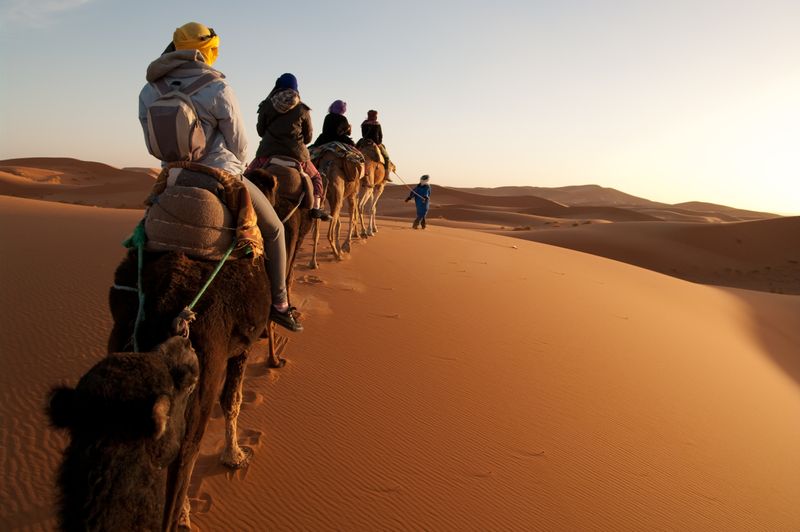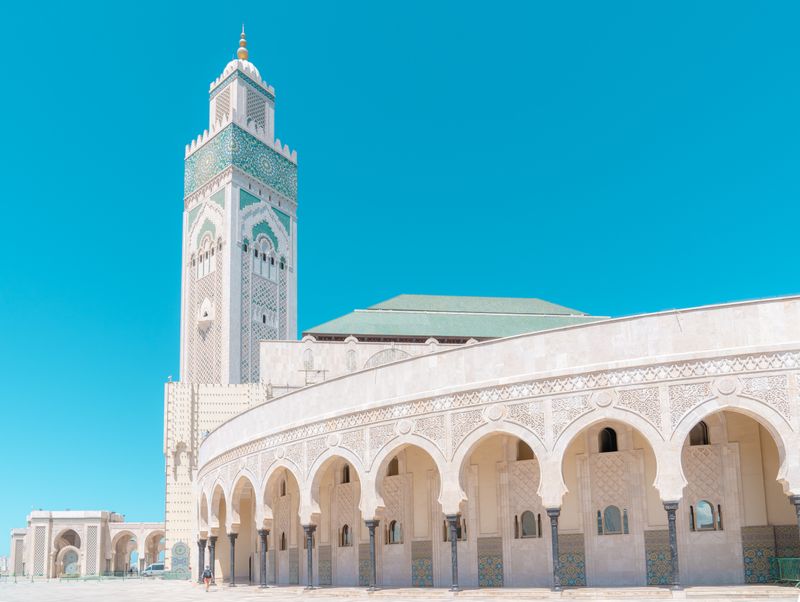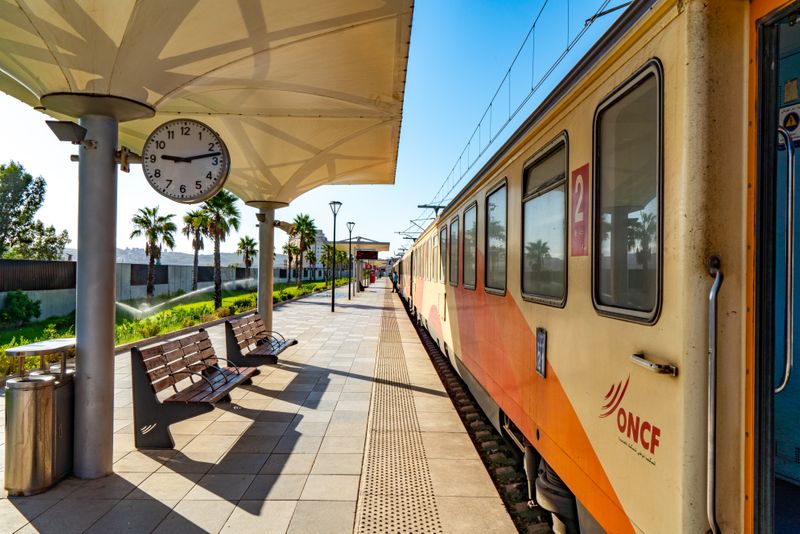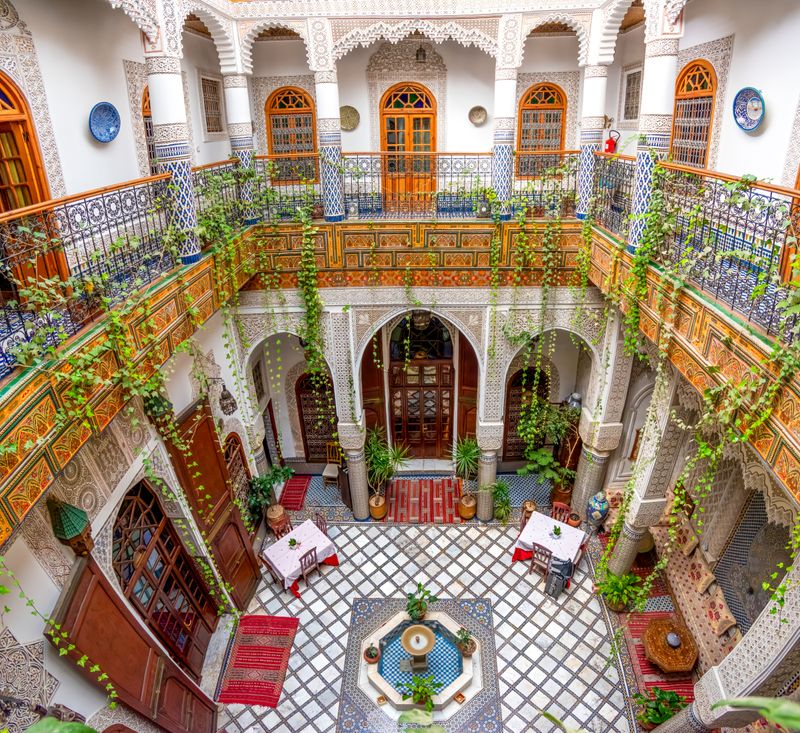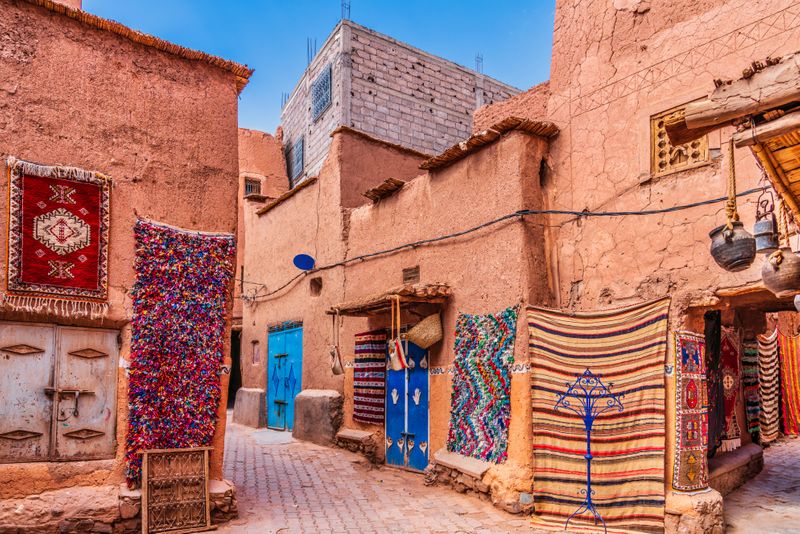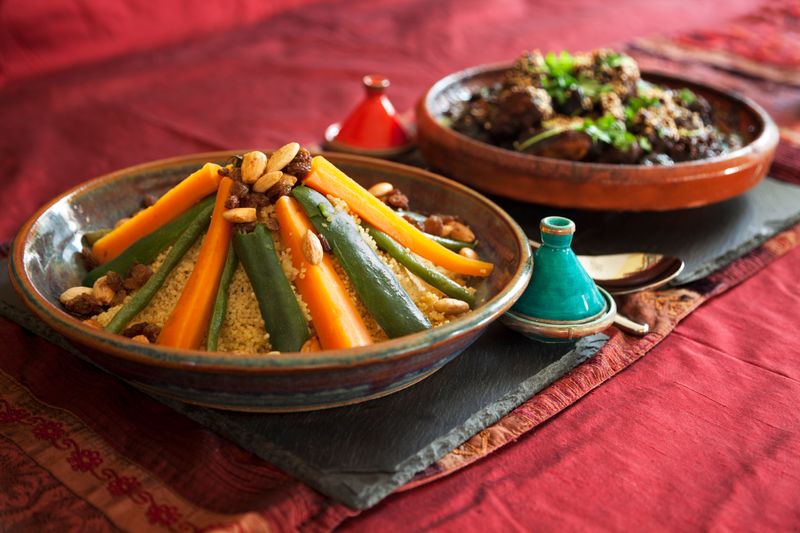Planning your first Morocco travel experience? From the winding alleys of centuries-old medinas to the stillness of the Sahara and the scent of spices floating through the air in bustling souks, Morocco is a sensory wonderland. But like any destination, travelling to Morocco is easier and more enjoyable when you know what to expect.
This guide is designed for first-time travellers looking for practical tips, cultural guidance, and itinerary ideas, plus some hidden gems and first-hand insights from seasoned explorers.
Why visit Morocco?
Morocco offers a rich mix of ancient tradition and vibrant modern life. It’s close to Europe yet feels completely different, with a blend of Arabic, Berber, and French influences shaping everything from the food and language to the architecture and fashion. There’s something new around every corner: mosaic-covered riads, the echo of the call to prayer, market stalls overflowing with leather goods, and roadside tajines slowly bubbling away.
Nature lovers, history buffs, foodies, and adventurers alike will all find something to enjoy. On a single trip, you might trek through the Atlas Mountains, visit a kasbah that once housed sultans, ride camels across golden dunes, and sip tea in a courtyard draped with bougainvillea.
When’s the best time to visit Morocco for first-time travellers?
Timing your visit well can make a big difference to your comfort and experience. In general, the best seasons for Morocco travel are spring (March to May) and autumn (September to November). During these months, the temperatures are more manageable and the crowds are lighter than in the peak summer period.
Summers in Morocco, especially in interior regions and desert areas, can be intensely hot, with daytime temperatures soaring well into the 40s Celsius (over 104°F). Coastal cities like Essaouira remain relatively mild, but many first-time travellers find the heat overwhelming.
Winter is cooler and often more peaceful. Snowfall in the Atlas Mountains makes for beautiful views, and while the cities remain active, it’s easier to explore without the heat. Just pack layers, especially if your itinerary includes higher altitudes.
Did you know?
The holy month of Ramadan shifts every year. During this time, many restaurants and shops reduce their hours or close during daylight. Travelling during Ramadan can provide a fascinating cultural insight, but it helps to be prepared for a slower pace of life.
How to get around: Morocco transportation tips for new visitors
Getting around in Morocco is an experience in itself. Transport here can range from the efficient to the unpredictable, but it's always interesting. Here are the main options you’ll encounter:
- Trains: The ONCF train system is comfortable and affordable, with routes connecting cities like Casablanca, Rabat, Meknes, Fes, and Tangier.
- Buses: CTM and Supratours are the two most reputable companies, with air-conditioned coaches and scheduled services to many towns and cities.
- Taxis: In cities, small taxis called petit taxis operate within city limits. Larger shared grand taxis are used for intercity trips. Always agree on the fare before the ride unless there is a working meter.
- Private drivers: For flexibility, comfort, and peace of mind, many visitors choose to hire a private driver. This option is especially useful if your Morocco itinerary includes multiple destinations.
- Car rental: If you're confident navigating unfamiliar roads, renting a car gives you total independence. Be aware that road conditions and signage vary, and city driving can be hectic.
Best Morocco itinerary for first‑timers
If you're visiting Morocco for the first time, it's worth building an itinerary that captures a range of the country’s highlights: cities, coast, desert, and mountains. A well-balanced trip helps you experience the diversity of Moroccan culture and geography.
Here’s a suggested two-week route for first-timers:
- Casablanca: Start in the economic capital. Visit the Hassan II Mosque, perched right on the Atlantic, and enjoy some excellent seafood.
- Rabat: Explore Morocco’s quieter political capital. See the Kasbah of the Udayas and the historic Chellah ruins.
- Chefchaouen: Head into the Rif Mountains to explore this photogenic town with blue-washed walls and relaxed vibes.
- Fes: Get lost in the maze-like medina, browse ancient tanneries, and experience traditional crafts. The city’s energy is unmatched.
- Merzouga & the Sahara: Travel into the desert, swap city noise for silence, and spend a night under the stars.
- Skoura or Dades Valley: Drive through the Valley of a Thousand Kasbahs and admire the lush oases and dramatic gorges.
- Marrakech: End your trip with a few days in this vibrant city. From souks to palaces and street food to rooftop cafes, it's a place that lingers in your memory.
This route covers many must-see Morocco attractions for new travellers and gives a little taste of everything.
Is Morocco safe for tourists?
Many first-time visitors ask, how safe is Morocco for tourists? The short answer is: generally very safe. Morocco is politically stable and welcomes tourists warmly. Violent crime is rare, and locals are often happy to help visitors. That said, as in many places, petty theft can be a concern in crowded areas.
Smart safety tips for Morocco travel:
- Avoid openly displaying valuables
- Carry a crossbody bag that zips closed
- Be cautious of scams in touristy areas
- Stick to well-lit areas after dark
- Be respectful in behaviour and dress, particularly in conservative areas
Travelling on a guided tour can provide extra peace of mind, as experienced local guides know the best routes, the safest areas, and how to handle unexpected challenges.
What to bring: Morocco packing list for first trip
Packing for Morocco involves a little strategy. The country’s climate varies by season and region, and its culture calls for modest dress.
Here’s a basic Morocco packing list for a first trip:
- Loose-fitting, breathable clothing (cotton or linen)
- Long sleeves and trousers or skirts that cover the knees
- Lightweight scarf or shawl
- A comfortable pair of closed walking shoes
- Sun protection: sunglasses, hat, and sunscreen
- A jacket or fleece for chilly evenings
- Swimsuit for coastal hotels or hammams
- Power adaptor (Type C and E)
- Travel tissues and hand sanitiser
- Copies of your documents (passport, insurance, bookings)
Did you know?
Hammams (public bathhouses) are still widely used in Morocco. Many hotels offer their own hammams, providing a gentler introduction to the practice.
Understanding Moroccan culture: A quick etiquette guide
Morocco is a country with deep-rooted traditions. Understanding local etiquette will not only help you avoid missteps but also enrich your experience.
Cultural tips for respectful travel:
- Greet people with "Salam Alaikum" and a smile
- Show respect during prayer times, especially near mosques
- Avoid public displays of affection
- Be mindful during Ramadan, and don’t eat or drink in public during daylight hours
- Remove your shoes before entering someone’s home
- Accept tea when offered, it’s a symbol of hospitality
Moroccan food: what to eat and where to try it
Moroccan cuisine is one of the most compelling reasons to visit the country. Deeply rooted in tradition and bursting with flavour, it reflects the region's rich cultural history. You’ll find influences from Berber cooking, Arabic spices, French techniques, and Mediterranean ingredients all blended into dishes that are as warming as they are memorable. Eating in Morocco isn’t just about the food itself; it’s about the setting, the rituals, and the generosity of hospitality surrounding each meal.
Markets and street stalls in every city tempt you with the scent of grilled meats and warm spices, while family-run restaurants and riads serve up time-honoured recipes made with love. Meals are often shared from a central dish, with fresh bread used in place of cutlery.
Must-try Moroccan dishes:
- Tagine: slow-cooked meat and vegetables infused with spices
- Couscous: steamed semolina with tender meats and vegetables, often served on Fridays
- Harira: a rich, comforting tomato-based soup with lentils, chickpeas, and herbs
- Pastilla: a sweet-savoury pastry layered with pigeon or chicken, almonds, and cinnamon
- Briouats: crisp, fried parcels stuffed with meat, cheese or vegetables
For dessert, try chebakia (honey-sesame pastries) or seasonal fresh fruit like pomegranate or oranges dusted with cinnamon. And don’t forget the fresh juices: orange, avocado, and even beetroot blends are popular street-side options.
Did you know?
The act of pouring mint tea from a height is considered a skill and shows respect to the guest. It also helps cool the tea and create a foam on top.
Morocco desert tours
The Moroccan desert is one of the country’s most captivating landscapes. Standing at the edge of the Sahara, watching the sun melt into a sea of sand, is a memory that stays with travellers long after the journey ends. The silence is complete, broken only by the soft padding of camel hooves or the whistle of wind across the dunes. Nights in the desert bring a canopy of stars so bright and close it feels as though you could reach out and touch them. There’s a stillness here that offers a rare kind of peace.
Travelling with Inspiring Vacations means you’ll experience the desert with knowledgeable guides, well-planned itineraries and trusted local partners. From camel rides across golden dunes to traditional Berber-style camps, every detail is handled for you so you can fully enjoy the moment. Curious about what to expect? Our full article on camping in the Sahara offers a closer look.
Here are some of our Morocco desert tour tips for beginners:
- Pack for cold nights and hot days
- Bring a torch, sunglasses, and scarf
- Expect limited mobile signal
- Prepare for basic comforts
Quick recap: essential tips for first time in Morocco
Before you head off, here’s a quick summary of the essentials to help you plan confidently and travel with ease:
- Best seasons to go: Spring and autumn
- Transport options: Trains, buses, taxis, and private drivers
- Suggested itinerary: Casablanca, Rabat, Chefchaouen, Fes, Sahara, Skoura, Marrakech
- Safety tips: Be cautious with valuables, respectful with clothing and behaviour
- What to pack: Modest, breathable clothing, sun protection, walking shoes, scarf
- Cultural etiquette: Greet politely, avoid PDA, respect traditions and prayer times
- Cuisine highlights: Tagine, couscous, harira, pastilla, mint tea
- Souk tips: Bargain politely, take your time, carry cash
- Desert essentials: Pack for temperature shifts, expect simple comforts
- Family travel: Plenty of options for kids, warm hospitality, interactive experiences
Ready to plan your Morocco journey?
Explore the timeless beauty of Morocco on one of our curated adventures. The 15 Day Private Magical Morocco offers a seamless introduction to the country's wonders. Or, for something more expansive, discover the best of North Africa and Europe combined on our 20 Day Inspiring Spain, Morocco and Portugal with Barcelona Extension.
From the golden sands of the Sahara to the intricate alleyways of Fes and the spice-laden stalls of Marrakech, Inspiring Vacations will help you experience Morocco in a way that’s authentic, enriching, and unforgettable. Browse our full range of Morocco tours today and start planning the kind of trip that stays with you long after you've returned home.
